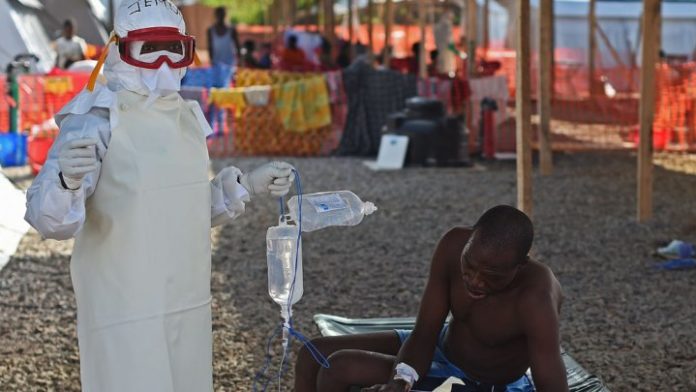
Ebola is leaving many survivors with severe side-effects long after the virus has been cured, the World Health Organization says, detailing a series of persistent health issues found in people who succeed in fighting the deadly disease.
Although Ebola was discovered nearly 40 years ago, little is known about the long-term health effects of the disease for survivors. That’s largely because Ebola has historically hit rural areas of Africa and then killed high numbers of those infected in a short period of time, giving researchers few survivors to study.
The most recent outbreak in West Africa is the largest to date, with more than 22,500 reported cases since March, including 9,000 deaths, according to the latest WHO data. With an estimated case fatality rate of 71 percent in the current outbreak, Ebola is still killing the majority of those it infects. But because of its unprecedented size, the 2014-2015 outbreak has already left more survivors in its wake than all other outbreaks combined.
With more people to study, the long-term effects are now becoming apparent. According to a report compiled by the WHO, about 50 percent of Ebola survivors in hard-hit Sierra Leone report declining health after fighting off the virus.
The mystery of ‘post-Ebola Syndrome’
Symptoms of the condition, which doctors refer to as “post-Ebola Syndrome”, or PES, include body aches (joint, chest or muscle pain), memory and hair loss, headaches, anxiety attacks, extreme fatigue and vision problems, according to the WHO. In some cases, people have also reported symptoms of mental illness, and some women have stopped menstruating.
“We need to understand why these symptoms persist, whether they are caused by the disease or treatment, or perhaps the heavy disinfection,” Dr. Margaret Nanyonga, psychosocial support officer for the WHO office in Kenema, Sierra Leone, said in a statement.
Doctors in West Africa said they have received some cases in which patients have become blind after fully recovering from Ebola, but they don’t exactly know why. “We see a lot of people with vision problems,” said Dr. Nanyonga. “Some complain of clouded vision, but for others the visual loss is progressive. I have seen two people who are now blind.” One possible explanation is a condition called Uveitis, or inflammation of the middle part of the eye, which can be triggered by infections and other problems in the immune system. If left untreated, it can lead to blindness.
While health experts are still struggling to explain the phenomenon, it is thought that Ebola infection might be making survivors more prone to autoimmune disorders, a medical condition where an over-stimulated immune system fails to recognize healthy tissues and attacks them. Doctors say they aren’t sure how long the symptoms will persist, and the long-term prognosis for survivors remains unclear.
Widespread post-Ebola effects
The lingering physical effects are not the only challenge facing Ebola survivors; most are also contending with immense psychosocial problems stemming from the outbreak. For instance, many survivors lost all of their possessions when their homes were decontaminated, while others lost entire families to the disease. According to a recent UNICEF report, at least 16,600 children have been left without one or both parents or their main caregiver in the three countries worst hit by the epidemic.
The outbreak has also left women and girls facing an increased risk of sexual violence, in part because of the disastrous economic consequences, including high unemployment, personal asset losses, poverty, and food shortages. Intense stigma also remains a huge challenge for Ebola survivors returning to the community. Al-Jazeera recently told the devastating story of 38-year-old Zidane Konneh, who was kicked out of his village after barely escaping the deadly grip of Ebola:
Thinking he was dead, hospital staff had put him in a body bag and thrown him onto a truck that was to take him off to be buried. [A nurse] noticed movement from the bag and opened it to find Konneh still alive.
Konneh survived but a staggering 38 members of his extended family died. Those still alive became social pariahs.
The family was kicked out of their compound … All the family’s possessions had been burned in their absence. Even the 500,000 leones ($116) savings Konneh had stashed inside his mattress went up in flames.
Now they live in the house of Konneh’s dead brother – another victim of Ebola – but when the lease runs out next month, the family will have nowhere to go. They have little money as nobody will hire them. Konneh’s colleagues at the mechanic shop he used to work at no longer want him around.
“In this country you are nothing without a job,” he said, sitting in the shade of a mango tree outside his new residence.
“We can’t even borrow water from another compound,” he added. “They say we are all Ebola people living here. They are afraid of us. If you go crying for help they will just laugh at you. There is no sympathy in the community.”
While countries around the world have made financial pledges to help West Africa recover from the outbreak, a recent report found that most of those donations are not making it to their intended targets. Those funds are critical not only for treating those infected with Ebola, but also for helping survivors in the aftermath of the disease.
Experts predict it will take at least another year to bring the outbreak under control. But as this report suggests, the effects of the disease are likely to persist much longer.
